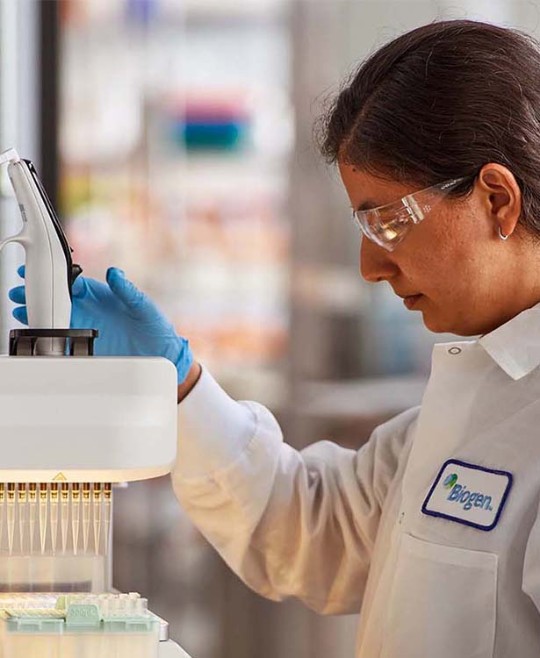Disease Areas
Lupus

Lupus
Lupus is a serious autoimmune disease which has historically and disproportionately impacted underrepresented populations.
Our Approach
As part of our long-standing efforts in neuroimmunology, we aspire to utilize our deep expertise in multiple sclerosis (MS), our knowledge of immunological pathways, and our scientific and development synergies to positively impact the lives of people living with serious autoimmune diseases such as lupus.
Innovative Research
Biogen’s decades of study at the crossroads of neurology and immunology provides us with expertise in multiple modalities that target immune cell pathways, which are anticipated to modulate disease in novel ways. Our goal is to provide more options for physicians and those living with lupus. Today, we’re developing what could be the first lupus portfolio in the industry, with first-in-class therapies in systemic lupus erythematosus (SLE) and cutaneous lupus erythematosus (CLE).
Stories
Living with lupus: Hazura’s story
Hazura Isilay, Associate Director in Product Complaints, talks about her experiences living with lupus and discusses Biogen’s continued efforts to address this devastating disease.
Clinical Trials
Biogen conducts clinical trials in lupus related to the investigational therapies in our pipeline to evaluate the efficacy and safety of potential medicines.
View all recruiting Biogen clinical trials in lupus
Deciding to participate in a clinical trial requires careful consideration. In most cases, the therapies investigated in clinical trials are not yet approved by regulatory agencies like the U.S. Food and Drug Administration (FDA). The benefits and risks of taking the treatment are not completely known. By volunteering for a clinical trial, you are helping the medical community determine whether new treatments are safe and effective.
Learn more about clinical trials and access programs
Facts and Figures
90%
Although anyone can develop lupus, an estimated 90 percent of people living with lupus are women; most begin to see symptoms between the ages of 15 and 40.1
9
The prevalence of SLE is 9 times higher among females than among males (128.7 versus 14.6 per 100,000), and highest among Black females (230.9 per 100,000).
5 m
It’s estimated that at least five million people worldwide have a form of lupus.4
- Pons-Estel GJ, Ugarte-Gil MF, Alarcón GS (2017). Epidemiology of systemic lupus erythematosus. Expert Rev Clin Immunol. 13(8):799-814.
- Drenkard C, Lim SS (2019). Update on lupus epidemiology: advancing health disparities research through the study of minority populations. Curr Opin Rheumatol. 31(6):689-696.
- https://investors.biogen.com/news-releases/news-release-details/biogen-announces-first-patient-dosed-phase-3-systemic-lupus
- https://www.lupus.org/resources/lupus-facts-and-statistics


